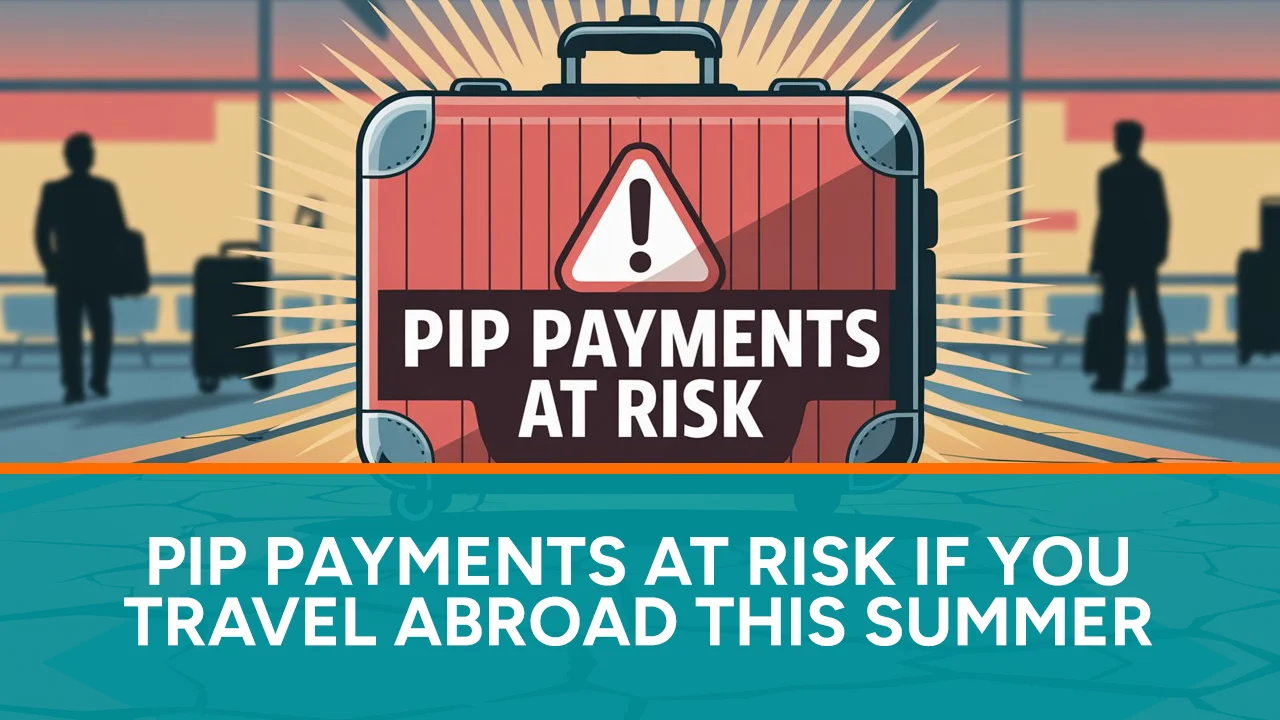As the UK warms up and summer holidays approach, many families start planning trips abroad. If you receive Personal Independence Payment (PIP), remember an important rule: leaving the UK for more than 13 weeks can lead to your PIP payments being stopped. This rule applies unless you’re travelling for approved medical reasons.
The Department for Work and Pensions (DWP) has strict travel guidelines for those on disability benefits. With travel picking up after the pandemic, many people are planning longer trips to visit family or escape isolation.
Losing your PIP can have serious consequences, affecting your care, mobility aids, and quality of life. Many people don’t know about these rules, so it’s essential to stay informed before you travel.
Understanding the Personal Independence Payment (PIP)
PIP is a benefit that helps people with daily living and mobility issues caused by long-term illnesses or disabilities. It does not depend on your income or savings.
The payment has two parts: one for daily living and one for mobility. How much you get depends on how your condition affects your daily life, not the condition itself. PIP aims to support independent living, including help at home, transportation, and access to special services.
However, PIP has strict eligibility rules. To keep getting payments, you must follow the DWP’s guidelines, including travel rules. The DWP travel rules for 2025 are similar to those for previous years but are often ignored, especially during summer holidays when many people travel.
What Are the Travel Restrictions for PIP?
The DWP says that if you receive PIP, you cannot leave the UK for more than 13 weeks at a time. This rule changes to 26 weeks if you travel abroad for medical treatment.
It’s easy to accidentally break this rule. Long vacations, visiting family, or travelling for medical reasons without proper documentation can lead to losing your PIP payments. It’s important to report your absence and the reason for it, not just how long you are gone.
Even short trips can be risky if you don’t inform the DWP. For example, if you plan a three-week visit and decide to stay longer without notifying them, your payments could be suspended or stopped.
How Long Can I Leave the UK on PIP?
Many people ask, “How long can I leave the UK on PIP?” The answer is 13 weeks for non-medical travel. If you plan to be away for more than four weeks, you must inform the DWP about your travel plans in advance. This is required and affects your benefits.
It’s essential to notify them in summer when many take long vacations. The rules for PIP benefits during summer are strict. If you don’t follow them, you might face delays or lose payments. Forgetting to notify can also lead to a review or audit of your account.
Planning is essential. Before you travel, make sure your trip meets DWP requirements. Keep records of your travel dates, where you’ll stay, and any medical needs. Many claimants find it helpful to talk to a benefits advisor or accountant for advice.
Who Is Considered ‘Habitually Resident’?
To qualify for PIP and keep receiving it, you must live mainly in the UK, Ireland, the Channel Islands, or the Isle of Man. This means you have a home, job, or family ties there.
Being habitually resident means the UK is your main home where you spend most of your time. This requirement is important. If you stay abroad too long or move away, you might lose your eligibility.
It’s risky not to tell the DWP if you leave the country. For example, if you go abroad temporarily to care for family or take a long vacation, they might see you as no longer habitually resident. To avoid issues, inform the DWP about your travel plans, especially for extended trips.
Medical Treatment Abroad: Exceptions to the Rule
One important exception to the 13-week rule is medical travel. If you leave the UK for necessary medical treatment, your PIP allowance can last for 26 weeks.
You must get approval from the DWP for this extension. Before you leave, provide all required documents and details. Don’t assume approval will happen automatically; if you don’t notify the DWP or submit your medical papers, your benefits might be stopped.
It’s also a good idea to carry copies of your doctor’s letter and appointment details when you travel. This can help if you’re contacted while away or need to confirm your location and treatment. The DWP may check in on you, especially if you’re gone for a long time.
The Consequences of Breaking the Rules
If you don’t follow the PIP rules while abroad, you can suddenly lose your benefits. Common reasons include:
- Failing to report an absence for over 4 weeks
- Exceeding the 13-week limit without approval
- Giving incorrect or outdated residency information
- Travelling repeatedly without declaring your plans
When your PIP payment stops, it can take weeks or months to reapply or appeal. You may have to pay back money if the DWP decides you shouldn’t have received payments while you were abroad.
This is why many people on benefits ask professionals, like accountants or legal advisors, for help before planning long trips. Planning ahead can really help.
What About Universal Credit and PIP Together?
People who get both PIP and Universal Credit face extra challenges. Universal Credit lets you travel abroad for up to one month, but you need to stay eligible and inform your work coach. If you travel longer than this, your Universal Credit could be impacted.
You have to manage the travel rules for both PIP and Universal Credit. Your work coach might ask for proof of your trip, like your return date, contact details while you’re away, and why you are travelling. Not providing this information could affect your work obligations under Universal Credit.
Also, keep in mind that Universal Credit is based on your income and situation. Any changes to your income, living situation, or time spent abroad could change your benefits.
Real-Life Example: Holiday Home Trap
Imagine this: a claimant spends 15 weeks at their holiday home in Spain without telling the DWP. When they return, they get a letter saying their PIP payments have been stopped because of their long absence.
Even with good intentions, not following DWP rules about holiday travel can lead to months without support. You might need to prove when you came back, explain why you were away, and possibly pay back benefits. If you rely on PIP for direct debits or care, this disruption can be serious.
If you own property abroad or have dual residency, it’s important to consult a professional advisor. The UK’s benefit travel rules are strict, and even honest mistakes can be expensive.
Steps to Take Before You Travel Abroad While on PIP
Before you book those plane tickets, here’s a checklist:
- Inform the DWP if you plan to be away for more than 4 weeks
- Keep travel under 13 weeks unless it’s for medical reasons
- Ensure your habitual residency remains in the UK
- Provide documents if requesting a medical treatment extension
- Keep a travel log, return flight details, and appointment letters
- Consult with a benefits advisor if your trip is complex or extended
These steps can help you keep your PIP while abroad. Keep good records, and be honest with the DWP to avoid future issues.
What to Do If Your PIP Payments Are Stopped
If your PIP payments stop, act fast. Contact the DWP to explain what happened. You might be able to provide evidence or appeal their decision.
Timing matters. Respond quickly to avoid delays. Gather all important documents like boarding passes, medical letters, and proof of accommodation for your appeal.
In serious cases, especially involving overseas residency or immigration, consider getting professional help. At Clarkwell & Co., we offer UK Visa and Immigration Advice in London to keep you informed and compliant. Our team can help with disputes and appeals, and understand DWP procedures.
Don’t Let a Holiday Cost You Your Benefits
Everyone deserves a break, especially those with long-term health issues. However, taking a break shouldn’t hurt your financial support. It’s important to understand the rules before planning any long trip.
Learn about the PIP residency requirements and follow the DWP travel rules for 2025. Make sure to inform the right authorities so you can enjoy your summer abroad without losing your benefits. Always be cautious and seek professional advice if you’re unsure.
If you have questions about your eligibility or travel plans, contact qualified experts. Your benefits are crucial; don’t risk your support over a vacation.







